How Inventive Public Library Outreach Builds Goodwill
From petting zoos to field trips, these initiatives forge strong ties with communities.
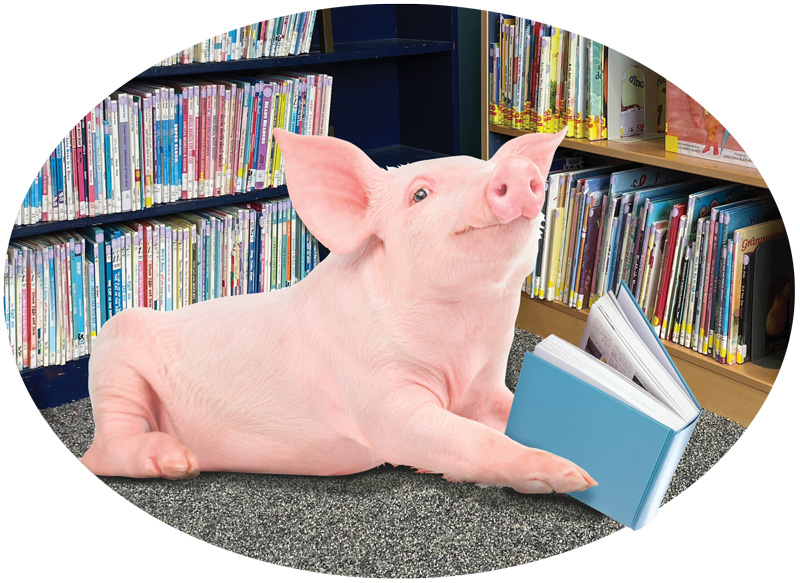 |
SLJ montage: Zelenenka/Getty Images (pig); Recebin/Getty Images (book).
|
Imagine going inside your local library and being able to interact with a llama, an alpaca, a pig, or a bunny rabbit. Young patrons at the San Francisco Public Library (SFPL) had that opportunity this summer through a program that brings a petting zoo into the library.
“Connecting youth with live animals during the summer is really important to us, because we live in a very urban environment,” says Christy Estrovitz, youth services manager for SFPL. “We want to build these connections with nature, with animals, so the child can have a full sensory experience and a safe experience at their library.”
Increasingly, programs like this that go beyond traditional library outreach efforts are becoming more common year-round. Conventional public outreach efforts such as toddler story times, homework assistance for older children, programs to teach senior citizens about technology, and bookmobiles aren’t going away. But, in many areas, they’re taking place alongside more unusual means of reaching the public. Like field trips for students on days when school is closed for teacher workshops. Or having a petting zoo.
In some San Francisco branches, the petting zoo is set up in a large meeting room. The animals are enclosed in a pen with hay spread across the linoleum floor. This works particularly well in branches without a lot of outdoor space. Those with more space on the grounds host the animals outdoors.
Groups of children from local preschools and summer camps come to see the animals.
“Hundreds of children have a small-group experience with these animals up close,” says Estrovitz. “They can touch a llama. They can hear the sounds of it running around, tapping its hooves on the floor of the library or outside in the courtyard. They have this really unique experience at the library.”
These unique experiences may have more importance now as more people return to in-person programming since the threat of COVID-19 has waned. But some libraries are still working to build back patronage.
“We have to be in our communities to remind our neighborhoods that we’re here,” says Estrovitz. “During shutdown, many people moved out of San Francisco. That happened in other cities as well. The world has changed, and we have this opportunity to build new relationships, to remind our neighborhoods that we’re here. The libraries were always here. It is not only a reconnection opportunity, but it’s also a reintroduction.”
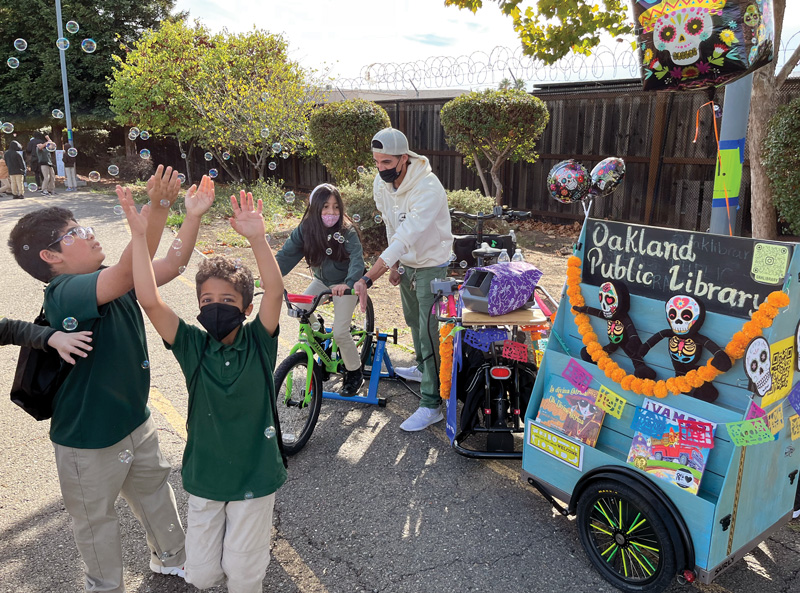 |
Kids at the Acorn Elementary School Health & Safety Fair in Oakland, CA, with Manny Hernandez of Oakland Public Library. Kids generated bubbles by cycling on a stationary bike; the display celebrated Día de los Muertos.Photo by Anthony Propernick/courtesy of Oakland Public Library |
At the Oakland (CA) Public Library (OPL), staff are making those reintroductions via bicycle. In East Oakland, the staff routinely take bikes to go out into the community to visit schools and attend festivals.
“It started because we don’t have a bookmobile,” says Pat Toney, a children’s services outreach librarian at OPL. “We have been challenged with space and funding and just maintenance, so we have bikemobiles at Oakland Public Library.”
The staff attach trailers, which look like bookshelves, to the bikes to make it easier to carry books. This high-visibility method of outreach attracts a lot of attention.
Toney says one of her colleagues, Manny Hernandez, is known for his work on a bike. Sometimes he rides a bike pulling a trailer with a spin bike on top. The spin bike makes bubbles, spin art, and even smoothies. Once he was asked to help people on a city bus check out books.
“The driver saw him and waved him over so that everyone on the bus could get a book,” she says. “I think that’s pretty amazing.”
The bikemobiles have the same purpose as traditional bookmobiles.
“It’s about accessibility,” says Toney. “The city is large and served by 17 locations. The east side is very much in need of resources, so we share books in the community to support home libraries and also provide awareness about the resources that the library offers. We have newcomers who weren’t familiar with the library. It’s important to get the word out and support literacy.”
In addition to the bikemobiles, the library offers bike fix clinics at two branches. Anyone can bring in a bike for help with repairs.
“I think, specifically, the project came about because there weren’t any bike shops on that side of town,” says Toney. “The library serves to meet needs and to reach people where they are.”
These efforts are focused on the residents of East Oakland.
“Our outreach is geared to underserved populations who may not know where the nearest library is, can’t get to the nearest library, or aren’t aware of library services,” says Toney.
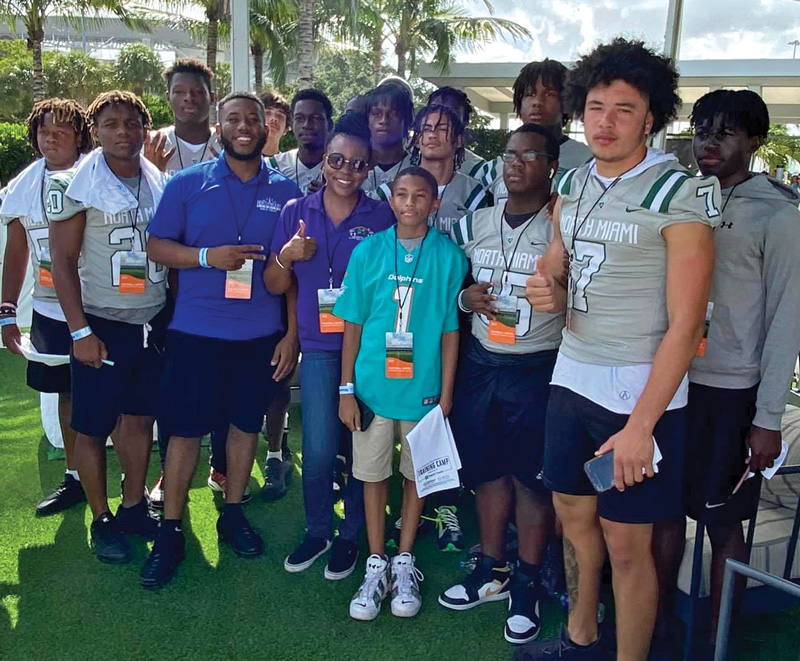 |
Popular, free field trips hosted by the North Miami Public Library include visits to the Miami Dolphins training camp.Courtesy of Homestead Cybrarium |
Across the country in North Miami, the city library provides special outreach to children and their families during the school year. For example, it offers free field trips for students when Miami-Dade County Public Schools are closed for teacher workdays.
Georgette Spratling wears a lot of hats for North Miami Public Library. She serves as the library manager, program coordinator, and youth services librarian.
The field trips sprang from an idea Spratling had to help her municipal library try to match some of the services provided by the larger Miami-Dade County Public Library.
“They offer museum passes,” says Spratling. “The museum passes aren’t only to go visit museums. They also have passes to the zoo and other fun places like that, and unfortunately, we don’t have those passes.”
When patrons came in requesting passes, her staff had to send them to the nearest county library.
“I don’t like to turn our patrons away,” she says. “I don’t like to say no, so I came up with doing field trips to these same places where the passes would take them.”
The field trips are designed for students from eight to 18. All the kids need a signed permission slip, and parents sign a waiver that allows the library staff to see to it that the children get medical care if they’re ever injured or become sick on an outing. The forms include the child’s insurance information and doctor’s name. The library caps the number of participants at 40, and parents are invited to tag along if they like.
“If the parents decide to take off, great, they can go with us, but if they can’t, they can go to work,” says Spratling. “They can drop their kids off here in the morning, and they know that their kids are safe. They know that their kids are getting an afternoon or morning full of education, culture, [and] fun, and they can pick them up when they get off work. So it benefits the family, not just the child.”
Parents also don’t have to worry about paying for anything. The costs for the tickets, transportation, and meals are covered by community partners.
The field trips aren’t just to museums. For their first excursion, the group was invited to visit the Miami Dolphins training camp. The kids were able to sit on the field and watch practice. They also had an opportunity to meet some players and get autographs.
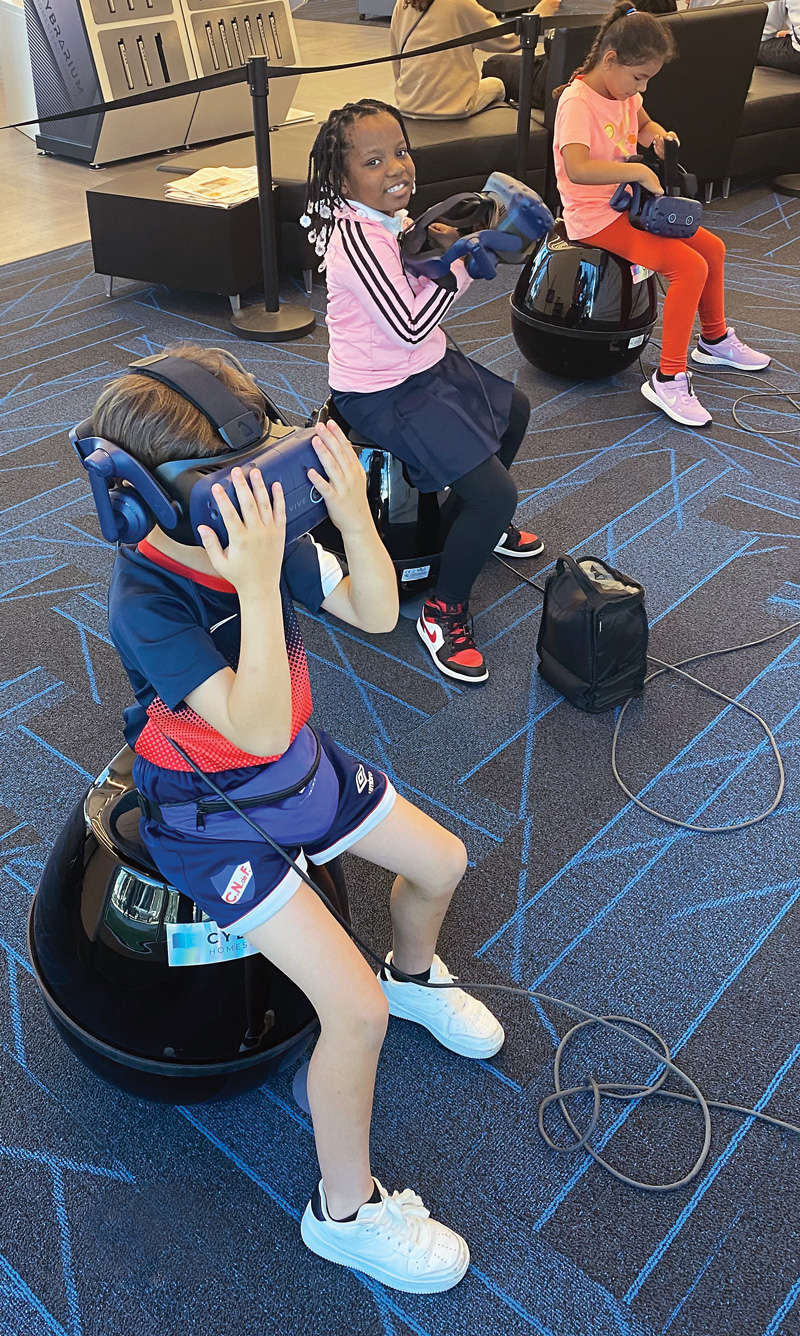 |
The Homestead (FL) Cybrarium, a municipal library with a children’s theater, VR, and more.Courtesy of Homestead Cybrarium |
“They treated the kids like royalty,” says Spratling.
For the last trip of the 2022–23 school year, the library took the students to another municipal library about 50 miles south of them called the Homestead Cybrarium, which is billed as a cyber library.
“It has all of the traditional library items,” says Spratling. “You can still check out books. There are still computers there for you to use, but they have a virtual reality system. They have a wonderful makerspace with all of these new cyber technologies. They have video games. They have STEM kits that you can check out. They have these computer tables where it’s just a flat surface, and you can play games on those computers or read books. It’s a wonderful place for parents to take kids.”
A library system in a Washington, DC, suburb is taking steps to connect with future patrons before they’re even born. The two-part Hatchlings program starts by reaching out to expectant parents “because the babies can hear them in utero,” says Pamela Hamlin, a family literacy specialist with the Prince George’s County (MD) Memorial Library System.
The program is modeled on two award-winning early-literacy initiatives started by librarian Betsy Diamant-Cohen: Mother Goose on the Loose and Mother Goose on the Loose Goslings, for parents of NICU babies.
The Hatchlings program starts by explaining brain development to soon-to-be parents. But the basic premise is simple: “Don’t wait ’til your child is two or three, but talk, sing, share books, and play with your little one when they’re very little, because that’s important,” says Hamlin.
Parents are invited to come back to the library several months after their children are born for part two of the Hatchling series, which involves teaching parents about the images infants like to focus on, the importance of being animated when reading to small babies, and how the library can support children as they transition from babies to toddlers.
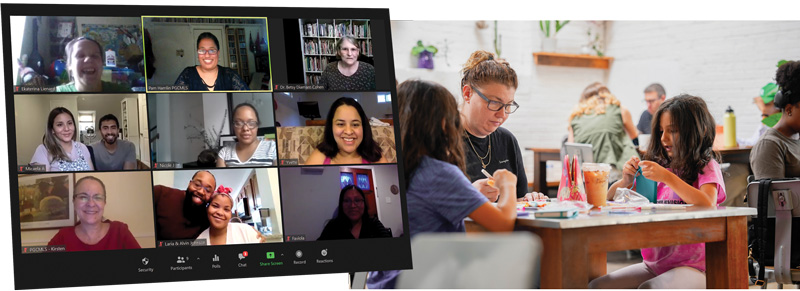 |
From left: Expectant parents attend the Prince George’s County (MD) Memorial Library’s online Hatchlings program; a Prince George’s Library “Craft & Create” event, hosted at a local café.Courtesy of Pamela Hamlin/Prince George’s Memorial Library System |
The Prince George’s library system also has special outreach efforts for young adults through something called book crawls.
“We go out into the community, and we might have trivia nights, or karaoke, or things like that,” says Hamlin. “We might have it at a bar or a restaurant or winery. We also do story times at farmer’s markets and festivals, so we can reach young families who may not have thought that the library is for them.”
The trivia nights may take place over the course of the summer. In addition to hosting the events, library staff provide information and a simple message to the young people who attend, Hamlin says.
“Even though you haven’t used a huge library since college, come visit your public library and see all the things that we have for you.”
Events like book crawls, petting zoos, library-based field trips, and bikemobile visits help libraries to stand out and get their message to people who may not be regular patrons. Putting them on often requires a sizable budget and a large staff, making these types of programs difficult to facilitate for smaller libraries.
But Spratling says these types of nontraditional means of outreach will be increasingly important in the future if libraries want to stay relevant.
“The libraries that are evolving will start getting more patrons,” says Spratling. “Programming for the new and the nontraditional is definitely important to bring people to the library.”
As far as libraries that haven’t embraced these new means of outreach, Spratling reluctantly says they could be at risk.
“I don’t like using these types of words because we don’t want any of the libraries to die out,” says Spratling. “But I think they have to get with the program if they want to continue to operate.”
Marva Hinton is a writer and editor who hosts the “ReadMore” podcast.
RELATED
The job outlook in 2030: Librarians will be in demand
The job outlook in 2030: Librarians will be in demand
ALREADY A SUBSCRIBER? LOG IN
We are currently offering this content for free. Sign up now to activate your personal profile, where you can save articles for future viewing






Add Comment :-
Be the first reader to comment.
Comment Policy:
Comment should not be empty !!!